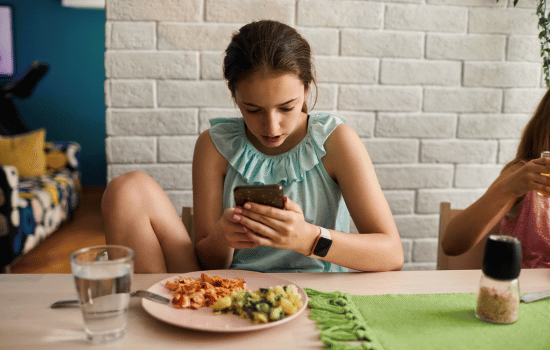Often when people think about weight loss, they think energy balance. You’ve probably heard the term “calorie deficit” in reference to dieting. So, it would make sense that losing weight would require counting calories.
But what about when you start choosing foods only based on their calorie content? Or when you become anxious and upset at the thought of having too many calories? Or ignoring your hunger cues in the name of calorie counting until you’re vulnerable and give into binge eating? When can calorie counting become an eating disorder?
Why some people count calories
Calorie counting is a common tool for losing weight. When simplified, losing weight requires consuming fewer calories than you burn. Some people use calorie counting apps (such as my fitness pal), or tracking calories in a journal, or only eating low calorie foods in efforts to lose weight.
However, there are many other factors that go into losing and maintaining weight loss. Such as blood sugar regulation, preserving muscle mass, hormone balancing, and others. But, thermodynamics (aka energy balance) is a critical tool to lose weight.
The problem is, restricting calories has been conflated with healthy eating. If you only count calories and don’t factor in the nutrient density of foods you’re likely going to miss out on a lot of more important markers of health. Such as micronutrients that would actually support a healthy metabolism, stable energy levels, an optimal functioning nervous system, and many other benefits that would support both weight maintenance as well as overall health.
The other issue is, for many people, counting calories can be a toxic experience. For some, calorie counting can become obsessive. Constantly relying on calorie tracking apps, becoming anxious at the thought of going over your calorie count, and engaging in disordered eating behaviors that compromise your physical and mental health.
For others, consistently under eating and restricting certain foods that have nutrients your body needs can build until you teeter over the edge and engage in binge eating. And for some, going over what is considered an “acceptable” calorie limit can result in the urge to engage in purging behaviors. All of these behaviors, and others, are disorder symptoms.
Is counting calories bad for your mental health?
Determining if calorie counting can slip into an eating disorder for you is dependent on a few factors. This is where you have to be aware of your personal tendencies. Calorie counting may be a toxic behavior for you if you are someone who:
-tends to feel anxious more often than others
-has obsessive tendencies
-is critical of their body
-has a hard time saying kind things about yourself and your body
-has perfectionist tendencies
-feels the urge to eat when emotionally vulnerable
-has a history of disordered eating or eating disorder symptoms
-struggles to regulate your hunger and fullness cues
-sees weight loss as a solution to problems in your life that are not directly related to your weight (e.g. self worth, relationship status, social acceptance, depression, anxiety)
-has a history of substance abuse or dependence
-has micronutrient deficiencies
-has a chronic health conditions
-your food intake tends to be tied to your self worth
-has unrealistic expectations of how your body will change (e.g. only losing weight on your stomach, shoulders and rib cage appearing narrower, maintaining a full chest but losing weigh everywhere else)

Signs that obsessive calorie counting is turning into an eating disorder
If you are already using calorie counting, then how do you know when calorie counting slips into disordered eating? The answer is when it begins to compromise your mental and/or physical health.
This can be hard to see in yourself, so it may be helpful to speak with a loved one or medical professional about your experience with calorie counting. Symptoms that calorie counting has become an eating disorder can include:
-avoiding eating with family and friends
-obsessively checking nutrition labels for calorie content
-looking at calorie tracking apps as a grade on your worth as a person
-avoiding nutrient dense foods you enjoy because of their calorie counts (e.g. avocados, olive oil, eggs)
-over restricting food, then engaging in binge eating when emotionally vulnerable,
-developing signs of nutrient deficiencies (e.g. brittle hair and nails, duller skin, chronic fatigue, scaly dry skin, worsening depression/anxiety, difficulty sleeping)
-obsessively counting calories
-restricting to the point of fatigue, dizziness and brain fog
-strongly tying your self worth to your weight
-believing over eating will inevitably lead to weight gain that results in some sort of social or emotional rejection
-concern by a friend or family member that you aren’t taking care of yourself
-continuously changing your goal weight to meet a new standard
-fixation on how many calories every food you eat has
-anxiety with changing schedules and an inability to stick to your routine
-spending a long time critiquing your appearance in the mirror
-avoiding your reflection completely due to discomfort with your appearance
-engaging in intense exercise even when not feeling physically well
-only eating certain foods if you burned a certain amount of calories
-avoiding exercises designed to build muscle for fear of weight gain
-weighing yourself daily despite anxiety around number on the scale
-limits food so you can drink alcohol without going over a calorie limit
-going cold turkey on all of your usual foods once you start a diet
-becoming anxious and fearful about certain behaviors and foods out of fear you’ll gain weight

Alternatives to calorie counting
If calorie counting isn’t mentally healthy, what’s the alternative? What can you do to improve your health when you stop tracking calories? There are alternative approaches to healthy eating that are much better for your both mental and physical health
Intuitive Eating
Intuitive eating is an anti-diet approach to to eating and physical activity that is all about connecting with your body to provide it what it needs. Intuitive eating is about listening to your hunger cues, being present while eating, and finishing meals when satiated. This may sound simple for some, but incredibly challenging for those with a history of dieting or disordered eating. That is because they’ve avoided listening to their bodies and have relied on external cues for what and when to eat for a long time. It may take a while to get back in touch with these internal cues, and that is ok. Working with someone who specializes in intuitive eating can help you get back in touch with the hormones, physical sensations and mental feelings that drive these cues.
Intuitive eating also require rejecting the diet mentality. This includes eliminating diet rules around food, making peace with your anxiety around certain foods, learning how to cope with emotions without binging or restricting food, and engaging in physical activity for the non-weight or food related benefits. This journey can result in a lot of anxiety relief for people who tend to obsess about their weight and body image. For more information about intuitive eating and how to move away from diet culture, reach out to a registered dietitian who specializes in intuitive eating.
Plate Model
The plate model is an approach to building meals that promotes balancing food groups to meet nutrient needs. For weight management, this can include having a plate that is about half non-starchy vegetables (e.g. leafy greens, broccoli, peppers, onions, asparagus, cauliflower), a quarter protein (e.g. chicken, steak, fish, tofu), a quarter starch (e.g. bread, rice, potatoes, sweet potatoes, fruit) and topping with fat sources (e.g. oil, butter, sauces). This approach focuses on nutrient density, while promoting high fiber and protein intake to support feelings of fullness without high calorie density or having to obsess over calorie counting. It also doesn’t ban any foods, so any craving you have can be met without having to go overboard. This approach is best utilized when combined with mindfulness practices that allow you to better understand your hunger/fullness cues and what motivates your cravings.
Mindful Eating
Mindful eating can occur in the context of intuitive eating or independently of intuitive eating. Mindful eating requires being present and calm while your eating. This involves understanding what is driving your eating (is it hunger, boredom, emotions?), eating when feeling physical hunger, being present and focused while eating slowly and calmly, finishing eating when you feel satiated, and being conscious of your hunger and fullness cues throughout the day. Helpful tools for this can involve keeping a food/feelings journal, meditation, and working with a dietitian who can provide guidance on better understanding your relationship with food and your body.
Body Neutrality or Body Positivity
Body neutrality and body positivity are not diets or eating patterns, but rather approaches to how you view your body that release you from viewing your weight through the lens of diet culture. They do this in different ways, but they both can offer significant relief for those who are struggling with consistent negative thoughts about their body.
Body neutrality emphasizes viewing your body neutrally both emotionally and physically. Your body is what it is, and that is ok. It’s not about celebrating changes in your body, and also not demonizing your body when it changes in a way that may not be traditionally socially desirable. It focuses on how your body functions, making lifestyle modifications to promote healthy function rather than considering appearance or weight as a factor.
Body positivity, on the other hand, is about embracing your body as something that is beautiful and worthy of love regardless of size, appearance, abilities, etc.. The body positivity movement began to celebrate those living in bodies that were traditionally stigmatized, especially those living in larger bodies. Body positivity embraces health behaviors for the purpose of overall health rather than to change body size. Body positivity also promotes the dismissal of the cultural beauty standards that prop up diet culture and stigmatize bodies that don’t meet these standards.

Get support ditching calorie counting for good
If calorie counting has contributed to an unhealthy relationship between you and your body, then it may be time for you to start exploring alternatives. This process can be challenging because it will require you to confront some long held beliefs around food and weight, and by extension how you view yourself. Working with a registered dietitian who specializes in a non-diet approach can help.
When working with intuitive eating dietitians, like those at Jill Gulotta Nutrition, you’ll start to explore your relationship with food. What drives your food choices? Are you ignoring hunger cues until you hit a point of desperation? Are you eating to cope with emotions? Are you putting certain foods on a pedestal by restricting them, only to binge them when vulnerable? Are you over-restricting and compromising your ability to maintain any weight lost? All of these questions and more can be answered by working with a dietitian.
If you are interested in taking these steps, please reach out about setting up an initial conversation to see if Jill Gulotta Nutrition would be the right fit for you. Or, if you’re concerned a loved one may be showing disorder symptoms, send them this article and ask if they want to be connected with professional help today.


